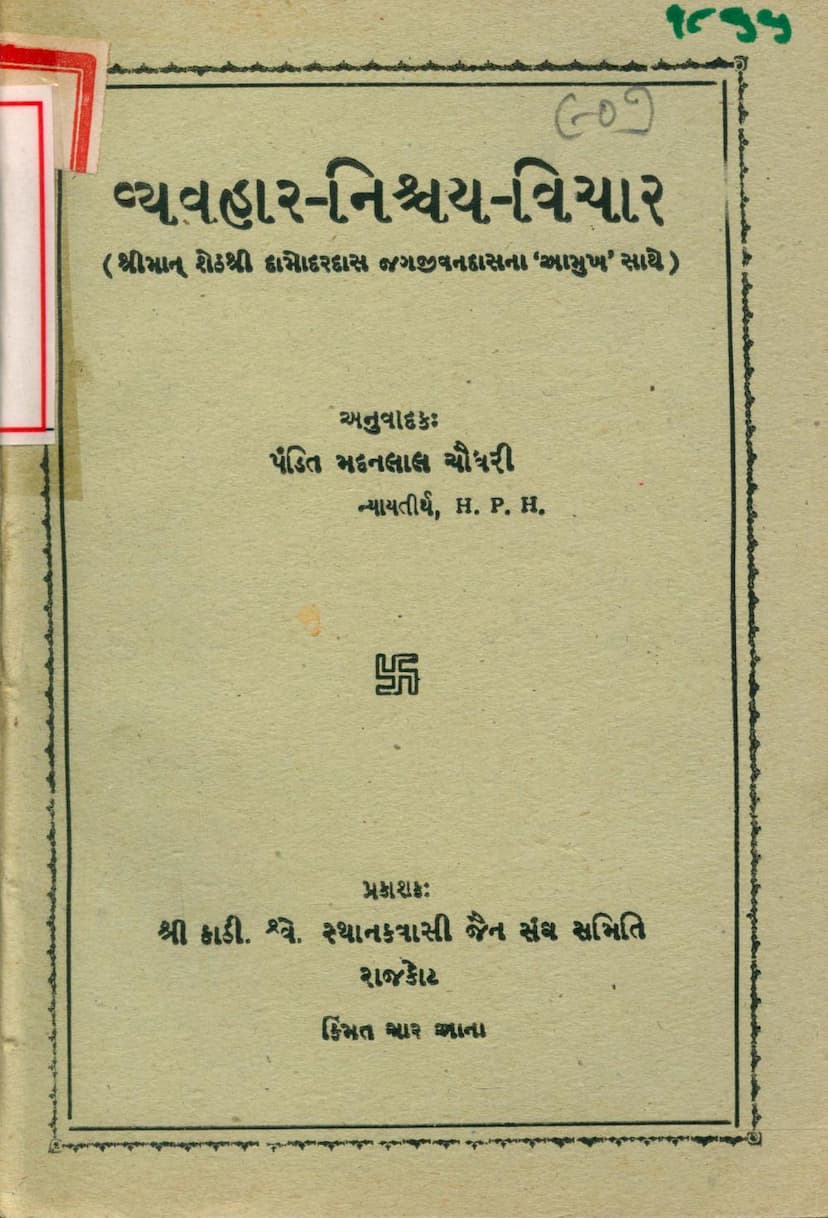Vyavahar Nischay Vichar
Added to library: September 2, 2025

Summary
Here's a comprehensive summary of the Jain text "Vyavahar Nischay Vichar" by Madanlal Chaudhary, based on the provided pages:
Book Title: Vyavahar Nischay Vichar (Practice and Ultimate Truth) Author: Madanlal Chaudhary (Translator) Publisher: Kathi Shwetambar Sthanakvasi Jain Sangh Samiti, Rajkot
Overview:
This book is a translation and adaptation of a Sanskrit work titled "Yuktiprabodh Natak" by Acharya Meghvijay Upadhyay. The original work, written in the late 17th century, aimed to critically examine and refute the views of Banarasi Das, a proponent of what the text considers an extreme form of "Ekantavad" (one-sided doctrine) within Jainism. The current publication is presented by the Kathi Shwetambar Sthanakvasi Jain Sangh Samiti with the intention of promoting a correct understanding of Jain principles, particularly the interplay between Vyavahar Naya (practical/conventional truth) and Nischay Naya (ultimate/absolute truth).
Core Theme:
The central theme of the book is the exposition and defense of the Jain philosophical concept of Syadvada (the doctrine of manifold predicaments or conditional predication), which emphasizes understanding reality from multiple perspectives. The author and the publishing committee are concerned about a contemporary movement, particularly originating from Songadh, which they believe overemphasizes Nischay Naya (ultimate truth) to the detriment of Vyavahar Naya (practical truth). This, they argue, leads to a skewed understanding of Jainism, neglecting crucial aspects like ethical conduct, rituals, and austerities.
Key Arguments and Points Discussed:
-
The Importance of Both Nayas (Vyavahar and Nischay): The book strongly advocates that both Vyavahar Naya and Nischay Naya are essential and equally valid in understanding Jainism. It quotes scriptures like Amritchandra Acharya's commentary on Samaysar and the Panchavastuka to highlight that abandoning either nay leads to the destruction of the Jain path (tirth) or the ultimate truth (tattva).
-
Critique of "Ekantavad" and Extremist Spiritualism: The text criticizes certain interpretations that, in their pursuit of extreme spiritualism or "pure consciousness" (Shuddha Bhav), deny the practical realities of life and the necessity of rituals, vows, and ethical actions. The author argues that such an approach leads to "Ekantavad" (one-sidedness) and ultimately Mithyatva (false belief).
-
Misinterpretation of Key Jain Concepts: The book addresses several areas where the "Songadh movement" (as termed in the preface and appendix) is seen to misinterpret Jain teachings:
- Moksha as a Goal vs. Method: They argue that pure consciousness (Shuddha Bhav) or freedom from passion (Vitrag Bhav) is the goal of moksha, not the sole method. Mistaking the goal for the method can lead to neglecting the path.
- The Role of Action (Kriya): The text emphasizes that actions (kriya), including asceticism (tapa), vows (vrata), and repentance (pratikraman), are not merely external rituals but crucial aids in purification and the path to liberation. It refutes the idea that only internal states are important and external actions are irrelevant.
- The Nature of the Soul: While acknowledging the soul's ultimate pure state, the book stresses that in the current stage, the soul is subject to karmic influences and requires practices for purification.
- The Meaning of Asceticism (Tapa) and Vows (Vrata): These are presented as essential for accumulating merit and purifying the soul, not as mere external displays or obstacles to spiritual progress.
- The Importance of Conduct (Vyavahar): The text strongly defends the necessity of external conduct, rituals, and ethical practices as integral to the Jain path, citing scriptural examples and the teachings of prominent Acharyas.
-
Defense of Svetambara Traditions: While not explicitly stated as a primary focus, the context of the publisher and the reference to refuting Banarasi Das (often associated with Digambara views) suggests a defense of Svetambara practices and interpretations, particularly concerning the role of rituals and the acceptance of certain external practices.
-
The Dangers of Misguided Spirituality: The book warns against spiritual paths that offer liberation without effort or emphasize intellectual understanding over practical application. It highlights the risk of being misled by charismatic figures or attractive philosophical arguments that deviate from the authentic teachings.
-
The Role of Acharya Meghvijay Upadhyay: The book highlights Acharya Meghvijay Upadhyay's "Yuktiprabodh Natak" as a significant work that addresses these philosophical debates. The translator, Madanlal Chaudhary, has taken excerpts from this work to address contemporary issues.
-
The "Songadh Movement" and its Concerns: The appendix and preface specifically address concerns about a movement originating from Songadh that is promoting certain interpretations of the "Samaysar" text, leading to a potential weakening of faith in traditional Sthanakvasi Jain practices like repentance, vows, and austerities. The committee aims to counter this by presenting the correct understanding of Syadvada.
-
Specific Practices Defended: The book elaborates on the importance of:
- Tapa (Asceticism): As a means of purification and shedding karma.
- Vrata (Vows): As essential for ethical conduct and spiritual discipline.
- Pratikraman (Repentance/Confession): As a crucial practice for acknowledging and rectifying faults.
- Charity (Dan): Emphasizing selfless giving (nishkam bhavna) as a means of purification.
- Brahmacharya (Celibacy/Controlled Sense-Pleasures): As a fundamental aspect of spiritual discipline.
- Mukhavastrika (Mouth-cloth) and Rajooharan (Broom): Defending their necessity for protecting minute beings, as per ancient Jain texts and practices.
Overall Message:
"Vyavahar Nischay Vichar" serves as a call to maintain a balanced understanding of Jainism, emphasizing that true spiritual progress lies in the harmonious integration of ultimate truth (Nischay Naya) with practical, ethical conduct (Vyavahar Naya). It urges the community to remain steadfast in their traditional practices and beliefs, warning against interpretations that undermine the importance of actions and rituals in the path to liberation. The book advocates for adherence to the teachings of the Tirthankaras as presented in the scriptures, rather than selective interpretations that might lead to deviation.